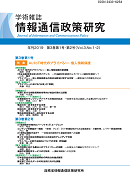Volume 3, Issue 1
Journal of Information and Communications Policy Vol.3 No.1
Displaying 1-9 of 9 articles from this issue
- |<
- <
- 1
- >
- >|
-
2019Volume 3Issue 1 Pages 1-24
Published: November 29, 2019
Released on J-STAGE: December 23, 2019
Download PDF (1061K) Full view HTML -
2019Volume 3Issue 1 Pages 25-45
Published: November 29, 2019
Released on J-STAGE: December 23, 2019
Download PDF (1160K) Full view HTML -
2019Volume 3Issue 1 Pages 47-72
Published: November 29, 2019
Released on J-STAGE: December 23, 2019
Download PDF (1065K) Full view HTML
-
2019Volume 3Issue 1 Pages 73-90
Published: November 29, 2019
Released on J-STAGE: December 23, 2019
Download PDF (979K) Full view HTML
-
2019Volume 3Issue 1 Pages 91-106
Published: November 29, 2019
Released on J-STAGE: December 23, 2019
Download PDF (948K) Full view HTML
-
2019Volume 3Issue 1 Pages 107-128
Published: November 29, 2019
Released on J-STAGE: December 23, 2019
Download PDF (1619K) Full view HTML
-
2019Volume 3Issue 1 Pages 129-144
Published: November 29, 2019
Released on J-STAGE: December 23, 2019
Download PDF (7450K) Full view HTML -
2019Volume 3Issue 1 Pages 145-160
Published: November 29, 2019
Released on J-STAGE: December 23, 2019
Download PDF (4091K) Full view HTML -
2019Volume 3Issue 1 Pages 161-173
Published: November 29, 2019
Released on J-STAGE: December 23, 2019
Download PDF (3823K) Full view HTML
- |<
- <
- 1
- >
- >|
